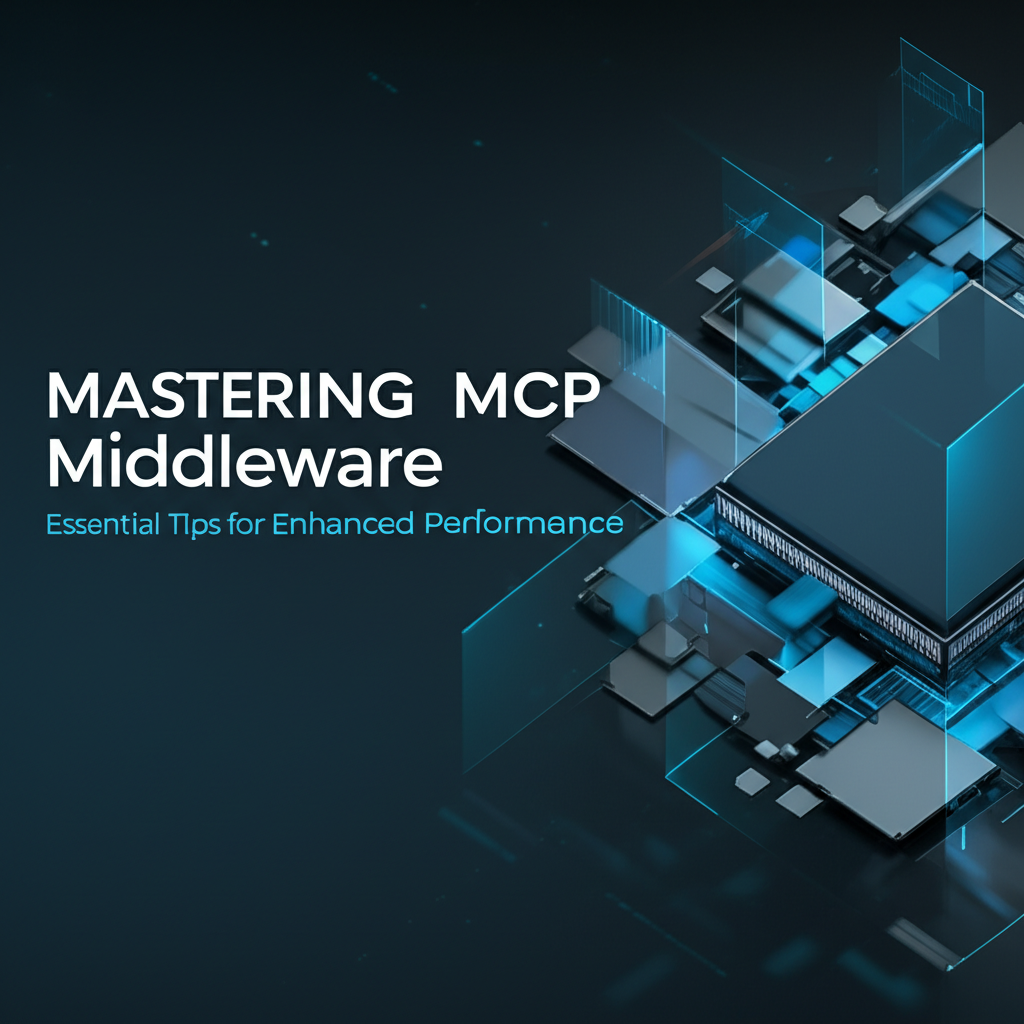Mastering MCP Middleware: Essential Tips for Enhanced Performance

Build AI Agents With Incredible MCP
Introduction
In the ever-evolving landscape of technology, the Model Context Protocol (MCP) has emerged as a game-changer for developers and businesses seeking to enhance the performance and connectivity of their AI systems. MCP Middleware serves as the bridge that connects AI Agents to a vast array of real-world data sources and tools. This article delves into the essential tips for mastering MCP Middleware, ensuring that you can leverage its full potential to drive innovation and efficiency in your projects.
Understanding MCP Middleware
What is MCP Middleware?
MCP Middleware acts as a crucial layer between AI Agents and the external resources they need to perform their tasks. It enables seamless integration of diverse data sources and tools, ensuring that AI Agents can operate at peak performance.
Key Features of MCP Middleware
- Interoperability: MCP Middleware facilitates communication between different systems and platforms.
- Scalability: It supports the integration of a vast array of data sources and tools, allowing for scalability as your AI systems grow.
- Performance: By streamlining data access and processing, MCP Middleware enhances the overall performance of AI Agents.
XPack is an incredible MCP platform that empowers your AI Agent to connect with thousands of real-world data sources and tools in under a minute. Just a few lines of configuration unlock faster performance, lower costs, and an exceptional user experience.Try XPack now! 👇👇👇
Essential Tips for Mastering MCP Middleware
1. Choose the Right MCP Tools
Selecting the appropriate MCP tools is the first step towards mastering MCP Middleware. Consider the following factors:
- Compatibility: Ensure that the tools are compatible with your existing systems and platforms.
- Features: Look for tools that offer a comprehensive range of features to support your specific needs.
- Community and Support: A strong community and reliable support can provide valuable insights and assistance.
2. Optimize Data Integration
Efficient data integration is key to maximizing the benefits of MCP Middleware. Follow these guidelines:
- Data Mapping: Map your data sources to the MCP framework to ensure seamless integration.
- Data Validation: Regularly validate the data to maintain accuracy and consistency.
- Data Security: Implement robust security measures to protect sensitive information.
3. Monitor and Analyze Performance
Continuous monitoring and analysis are essential for identifying and addressing performance bottlenecks:
- Performance Metrics: Track key performance indicators (KPIs) to measure the effectiveness of your MCP Middleware.
- Anomaly Detection: Use anomaly detection algorithms to identify and rectify issues promptly.
- Continuous Improvement: Regularly update and optimize your MCP Middleware to adapt to changing requirements.
4. Leverage Cloud Services
Cloud-based MCP Middleware solutions offer several advantages:
- Scalability: Cloud services provide scalable resources to accommodate growing data volumes.
- Accessibility: Access your MCP Middleware from anywhere, anytime, using any device.
- Cost-Effectiveness: Cloud services eliminate the need for expensive infrastructure and maintenance.
5. Stay Informed about Industry Trends
Keeping up with the latest industry trends and advancements is crucial for mastering MCP Middleware:
- Research: Stay updated on the latest research and publications in the field of AI and MCP Middleware.
- Networking: Attend industry conferences and join relevant online communities to exchange ideas and insights.
- Continuous Learning: Invest in training and development to enhance your skills and knowledge.
Case Study: Enhancing AI Performance with MCP Middleware
Background
Company XYZ, a leading e-commerce provider, faced challenges in integrating its AI-powered recommendation system with external data sources. The system was underperforming, leading to a subpar user experience.
Solution
Company XYZ implemented an MCP Middleware solution, leveraging XPack.AI to connect its AI Agents to a variety of real-world data sources. The following steps were taken:
- Data Integration: Mapped external data sources to the MCP framework.
- Performance Optimization: Identified and addressed performance bottlenecks.
- Continuous Monitoring: Implemented a robust monitoring and analysis system.
Results
The implementation of MCP Middleware led to a significant improvement in the AI-powered recommendation system:
- Enhanced Performance: The recommendation system now operates at a higher speed and accuracy.
- Improved User Experience: Users reported a more personalized and relevant shopping experience.
- Increased Revenue: Company XYZ saw a rise in customer satisfaction and sales.
Conclusion
Mastering MCP Middleware is essential for driving innovation and efficiency in AI systems. By selecting the right tools, optimizing data integration, monitoring performance, leveraging cloud services, and staying informed about industry trends, you can ensure that your AI Agents perform at their best. As a cutting-edge MCP platform, XPack.AI is a powerful tool to consider for your MCP Middleware needs.
FAQ
What is the Model Context Protocol (MCP)?
MCP is a protocol that enables AI Agents to connect with a wide range of real-world data sources and tools, enhancing their performance and capabilities.
How does MCP Middleware differ from other middleware solutions?
MCP Middleware is specifically designed to facilitate the integration of AI Agents with real-world data sources, making it a unique and valuable tool for AI developers.
What are the benefits of using cloud-based MCP Middleware solutions?
Cloud-based solutions offer scalability, accessibility, and cost-effectiveness, making them an attractive option for businesses of all sizes.
How can I ensure the security of data integrated through MCP Middleware?
Implement robust security measures, such as encryption and access controls, to protect sensitive information.
Can MCP Middleware be integrated with existing systems and platforms?
Yes, MCP Middleware is designed to be compatible with a wide range of systems and platforms, making it easy to integrate into your existing infrastructure.
What is the role of XPack.AI in MCP Middleware?
XPack.AI is a powerful MCP platform that enables AI Agents to connect with thousands of real-world data sources and tools in under a minute, enhancing performance and user experience.
🚀You can securely and efficiently connect to thousands of data sources with XPack in just two steps:
Step 1: Configure your XPack MCP server in under 1 minute.
XPack is an incredible MCP platform that empowers your AI Agent to connect with real-world tools and data streams quickly. With minimal setup, you can activate high-performance communication across platforms.
Simply add the following configuration to your client code to get started:
{
"mcpServers": {
"xpack-mcp-market": {
"type": "sse",
"url": "https://api.xpack.ai/v1/mcp?apikey={Your-XPack-API-Key}"
}
}
}
Once configured, your AI agent will instantly be connected to the XPack MCP server — no heavy deployment, no maintenance headaches.

Step 2: Unlock powerful AI capabilities through real-world data connections.
Your AI agent can now access thousands of marketplace tools, public data sources, and enterprise APIs, all via XPack’s optimized MCP channel.

